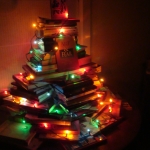When I grew up in rural Connecticut in the 1950s, we attended church in Quakertown, an area in Ledyard founded by the Rogerene Quakers in the 17th century. The Quakers of that time were trying to escape persecution by the Congregationalists. Both of my parents had been born at home in Ledyard and were descendants of the Rogerenes. The church service had evolved since the early days and had become fundementalist, similiar to a Southern Baptist style.
The main event of every worship service was music and lots of “praising” as people stood up spontaneously to say, “Praise the Lord!” They would mention the sick and needy during the praising periods and ask for blessings. Some people were overtaken by the Holy Spirit and rolled on the floor in the aisle while speaking in tongues, a nonsensical language over which the speaker supposedly has no control. For me, it seemed like a curious explosion of adult emotion. Kids didn’t “know” this language but grownups appeared to feel better afterwards. When they recovered and got back in their pew, they would be smiling and perspiring. I’m not sure what anyone expected, but they seemed relieved.
At Christmastime there were trees laced with paper chains and ropes strung with cranberries and popcorn at the front of the church. Choirs and soloists sang carols and children performed pageants and memorized poems. My grandmother inscribed my poem on the back of an empty Christmas card box. She wrote it out in longhand and, because I couldn’t yet read at age four when I was assigned my first poem, she spoke each line and I would repeat it until I could recite the whole thing. I still remember the first two lines:
“The nicest gift the world has known was just a little boy.
He came from Heaven down to earth to bring us love and joy.”
I vaguely remember standing in front of the congregation amid twinkling colored lights next to a huge evergreen tree covered with small boxes of hard candies, each tied to the tree with ribbon. After my recitation, all the children came forward to receive a decorated box of the red, green, and yellow candy and an orange.
Today, I still love the music and stories that have been written about that birthday. I enjoy my childhood memory of the provincial beauty and generosity of the event at Quakertown church, but I’m not concerned about whether someone arrived on Christmas morning to save me from sin. I don’t expect anything except that, as winter begins, it’s a time to acknowledge friendships with words, gatherings and perhaps gifts. I suspect that some people do feel a weightier expectation. Many could be in need of reassurance that they are okay and loved. They feel confused about how they must earn that love. They may not be able to assume that there is unconditional love in their midst. It may be difficult to find relief from despair.
My parents were generous and one of the traditions at Christmas, besides a huge party at the nursing home they owned and gifts for all the patients and staff, was making baskets of gifts for relatives and friends whom they thought were less fortunate than us. I remember those wicker baskets filled with fruit, brightly wrapped presents and perhaps a whole chicken or a turkey. We would drive around in the evening on Christmas Eve and make deliveries after the church service. My father would be wearing his best suit, wool overcoat and felt hat. Sometimes it was snowing.
Recently, I found the small cardboard box on which my grandmother had transcribed the poem I had to recite long ago. My mother saved everything and after she died I found it in a chest of drawers along with an envelope with two of my baby teeth. I realized that the simple nostalgic message of this poem had unconsciously become my holiday mantra even though I hadn’t seen the box and my grandmother’s writing in more than sixty years. Here is the second stanza:
“His coming made us all so glad
that on this natal day,
We try our best to honor him
by giving things away.”
(author unknown)
Based on all the things I found in my mother’s house after she died, she clearly saved as much as she gave away, but what she did save was a poignant reminder of a tender and generous time that helped me to know what Christmas can be.
Ruth W. Crocker is the author of Those Who Remain: Remembrance and Reunion After War. She lives, writes and reminisces in Mystic, Connecticut. Receive more thoughts and inspirations by subscribing to her blog at RuthWCrocker.com.

